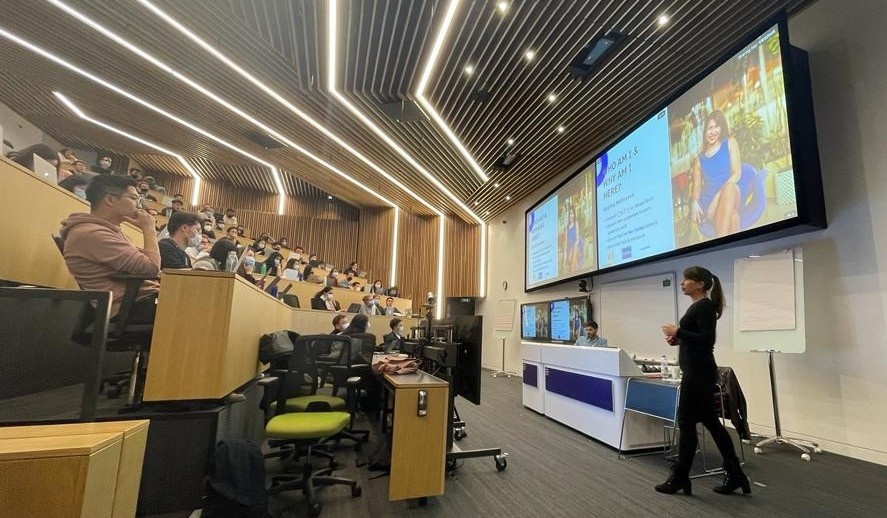Do you want to have a great career? Then you have to Speak Tech.
Digital transformation is everywhere. Even your coffee shop has an app!
If you want to succeed in today's digital economy, you need to know core tech concepts so you can work successfully with innovation teams and tech clients, and stand above the competition.
How To Speak Tech For Leaders
Learn core tech concepts and succeed in the innovation economy!
Do you want to lead in the Digital Age?

Navdeep Sachdeva,
Head of Strategic Sourcing at a Fintech business
Thank you, Sophia, for this wonderful course. There was so much to learn from this and I feel so much more powerful today after this course than I did before.
Classes taught at





Fru Bekefi
Second Home, Community & Innovation Programme Manager
Expect lots of actionable insights on what you need to know (hint, you won’t need to code).
You’ll end up saving years in trial, error and making your own mistakes.
- Do you hear the words digital transformation and wonder what this means in practice?
- Do you want to work with clients in the lucrative tech sector?
- Have you tried learning on the job and got even more confused?
In this course, you will learn the fundamentals of how apps, sites and algorithms get made. You will know who does what on a tech team and why they have different perspectives.
Outcomes:
- Understand the core concepts of how digital products get made & what role you can play
- Understand the different perspectives of developers, designers and data scientists
- Learn tech jargon and key concepts
- Learn how product goals relate to marketing and business outcomes
In this course you will learn
1) Digital business fundamentals & product management
- The key difference between traditional businesses and tech businesses
- Leading digital business models
- The product manager's perspective
2) Design Thinking & User Experience
- Introduction to design thinking
- Why designing for technology is different to designing for beauty
- User research fundamentals
3) What developers do & agile processes
- Introduction to the tech stack
- How companies use APIs to grow users, revenue and brand
- Back end and server basics
4) Growth hacking & analysis
- How marketing is built into product management
- The build, measure, learn cycle (+ case studies)
5) Artificial Intelligence, Data Science and algorithms
- What data scientists really do
- AI algorithm: not as hard as it sounds
- BONUS Session: The Business of AI, taught by Prof Marco Iansiti, professor of AI at Harvard Business School
This course assumes no prior knowledge of technology.
The details:
The course consists of five modules, split over five weeks. You will get pre-recorded videos, written material, suggested reading and homework each week to solidify your learning.
If you get stuck and need clarification on what you're learning, just post your question in the course website and you'll get a response within 24 hours.
This course is great for:
- ambitious professionals who want to transition into careers in digital
- leaders in companies going through digital transformation
- professional services experts who work with tech clients

Course Guide
Downloadable materials for each module

Curated resources
Recommended reading, podcasts & videos to enhance your learning.


Samantha Constance
University of Chicago,
Career Development
Sophia provided insights on how to effectively work in the tech business without having a tech background for the UChicago alumni community
She was a wonderful presenter providing actionable and motivating tips for fellow UChicago alumni.
We loved working with Sophia!

Hi, I'm Sophia
I am a non-technical founder, and I have co-created apps and algorithms that have been used by thousands, won App of the Day by Mashable, and were featured by Inc, the BBC and more.
I've set up the Tech For Non-Techies education community to help other non-technical professionals succeed in the innovation economy. You don't need to learn to code to be part of digital transformation, but you do need to know how to work with people who do.
I've contributed to the Harvard Business Review, Financial Times, The Guardian and Forbes on entrepreneurship and technology. I have also guest lectured at Chicago Booth, London Business School and the London College of Fashion to name a few.
I love helping new ideas come to life and I've advised the Blackstone x Techstars accelerator at the University of Texas, Chicago Booth’s New Venture Challenge and the Microsoft x London College of Fashion incubator, as well as many ventures and investors.
I hold an MBA from Chicago Booth, and a BSc (Hons) in Politics from Bristol.
I also speak Russian and French. I split my time between London and the South of France, where I play tennis and sail with huge enthusiasm and very little skill.


Irina Klokova,
Management Consultant
I consider myself lucky that I have discovered "Tech for Non-Techies" platform created by Sophia Matveeva (recommended by my friend).
She helped me see some of the mistakes that could have been avoided on my personal journey to creating a tech product.
Sophia has a talent for explaining complicated tech concepts with simple words. Her own experience gives non-digital native people like me some hope that we can also play roles in the new Digital Era.
Sophia's Story
When I got the admissions letter from Chicago Booth, I thought life was going to be sorted. Or at least my career!
The University of Chicago Booth School of Business was consistently ranked as the global #1 business school by Business Week and The Economist, so I was feeling pretty smug.
My plan, as I wrote in my admissions essay, was to get to business school, come up with a brilliant startup idea, get a team together, get funding and leave with an MBA and a startup. Naturally, world domination would follow.
By this point, I had worked in a top financial PR company, had a stint in a private equity firm in London and worked in India. I had very little knowledge of the tech sector, but it seemed to be where all the opportunity was coming from.
I desperately wanted to join the tech boom, and spent most of business school testing various ideas for tech startups. Eventually, the beginnings of an idea for a retail tech business began to take place.
I managed to convince some of my classmates to join me and, through sheer bloodymindedness, we got into the Chicago Booth New Venture Challenge, the top academic accelerator in the United States.
The problem was, none of my classmates actually new how to build the thing we were pitching. Naturally, we didn't get very far in the accelerator, but again, through more persistence and bloodymindedness, I managed to raise some angel funding and marched bravely towards global tech domination.
This is when disasters began to strike. I worked with a part time CTO, who was planning to raise his Big Tech job when we had raised more money. He said words to me I did not understand.
I looked them up on Google and watched endless YouTube explanations, but that left me more confused. I signed up and paid for coding courses, which I either hated and completed or failed to finish and wallowed in guilt.
There are plenty of courses helping you to retrain to become a developer or a data scientists, but that's not what I needed. I needed to know how to work with technical professionals to deliver a product into users' hands.
I ended up learning how to hire and work with developers, designers and data analysts on the job. It was a hard, painful and expensive journey, but when I was going through it, there was no other way.
I began writing about what I was learning in Forbes, and when my article What Non-Technical Founders Really Need To Know About Tech reached thousands in less than a day, I realised that I was not alone.
I began giving talks to help non-technical entrepreneurs get the skills and confidence to build their tech ventures. I taught University of Chicago alumni, spoke at the Mayor of London's international trade promotion agency London and Partners and at entrepreneurial hubs like WeWork.
One day, an MBA student from London Business School came to my talk and found it so useful, he convinced London Business School to host the course.
Since then, the students have used my courses to create their first products, transform their careers and innovate at the world's largest companies.
I believe it is not only possible but desirable for people without computer science backgrounds to be an active participant in today's digital economy.
What happens if I can't attend the live sessions?
Will I get feedback for my homework?
Do I need to know how to code or have any technical skills?

Ali Jetha, Investor & Chicago Booth MBA
As an angel investor in technology, I find Sophia’s insights and advice very useful, as well as time-saving, helping filter the relevant aspects. Thank you!
